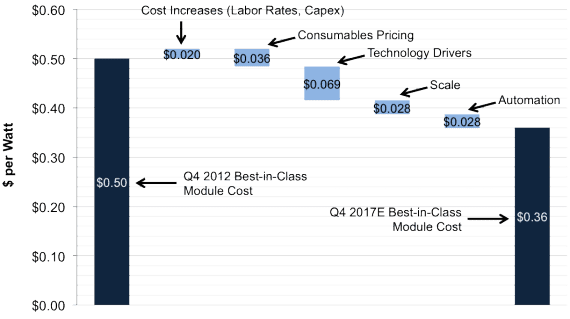Production costs for industry-leading crystalline-silicon PV modules is set to fall from 50 cents per watt at the end of 2012 to 36 cents per watt by the end of 2017, according to a new report from GTM Research. The 112-page report, PV Technology and Cost Outlook, 2013-2017, predicts that around 80 percent of this price decline will stem from the industry’s adoption of advanced technology platforms and manufacturing automation innovations, reports Greentech Media.
“Yesterday’s PV cost reduction roadmaps are no longer relevant today,” said Shyam Mehta, Senior Analyst at GTM Research and the report’s author. “Three or four years ago, the industry was targeting one-dollar-per-watt costs in 2013; today, we are at 50 cents per watt, and there is currently little consensus on what is a realistic goal for the module supply chain to set for itself over the next three to five years. This is important not only for these manufacturers and their investors, but also for installers and project developers across the globe.”
As Nicholas Brown at CleanTechnica points out, this drop in solar panel prices means much more than making solar more affordable for more people.
“Solar panel costs of $0.36 per watt make it more feasible to install additional solar panels to back each other up instead of using any other type of power plant (for off-grid setups), reducing the need for batteries,” Brown says.
“For example: If you need 1,000 watts of power, and your 1,000 watt solar panel generates only generates 50% of its capacity (500 watts) due to cloudy weather, that can be compensated for by using two of those 1,000 watt panels instead of one, so you could still draw 1,000 watts from that 2,000 watt (nameplate capacity) array.”











